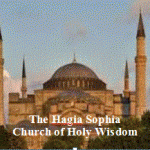 Until recently the common expression by which we identified ourselves as a Church was Ukrainian Catholic. When Ukraine gained its independence, we reverted to our original name, Ukrainian Greek-Catholic. Although we have referred to ourselves as Christians using the Byzantine ritual, this word Byzantine has a pejorative connotation by some Western standards to signify a state of inferiority of both mind and spirit. The first vilification of the name came from the Carolingian officials when their King, Charlemagne, was refused by Constantinople the title of “Emperor of the Romans.” Since that time disputes and wars grew ever bitter between Byzantium and the West. It reached an apex in the fourth Crusade when the Crusaders, all Western Christians, sacked Constantinople.
Until recently the common expression by which we identified ourselves as a Church was Ukrainian Catholic. When Ukraine gained its independence, we reverted to our original name, Ukrainian Greek-Catholic. Although we have referred to ourselves as Christians using the Byzantine ritual, this word Byzantine has a pejorative connotation by some Western standards to signify a state of inferiority of both mind and spirit. The first vilification of the name came from the Carolingian officials when their King, Charlemagne, was refused by Constantinople the title of “Emperor of the Romans.” Since that time disputes and wars grew ever bitter between Byzantium and the West. It reached an apex in the fourth Crusade when the Crusaders, all Western Christians, sacked Constantinople.
Because the word Byzantine represented the essentially Christian culture of an essentially Christian Empire, the atheists and anti-Christian encyclopedists of the 18th century, namely Voltaire, Montesquieu and, after them the famous English historian Gibbon, created an aura of disgust and horror around it. Under their influence, the word Byzantine came to be, in European languages, synonymous with “barbarous,” “futile,” and “inane.” Everyone shied away from its use. One author remarked: “For centuries after the Crusades, it was the fashion in Europe to regard the Empire whose seat was beside the Bosporus as a grotesque ruin, a crumbling relic, an outworn survival which cumbered the ground only because the servants had been too lazy to sweep it away” It was not until the late 19th century, and especially in the twentieth, that this word and what it represents, were vindicated and rehabilitated to honor and glory.
By contrast, the word Greek had always enjoyed popularity and general acceptance. It connoted harmony of thought, artistic taste, poetry, beauty and human dignity. The official language of the Empire was Greek. The word “Greek” represented the most refined paganism with its marvelous culture. Even that most astonishing discovery in chemistry made by the Syrian Callinicus of Heliopolis was called “Greek Fire”
Since the beginning of Christianity, and for a long time later, Greek was the official language of both the Eastern and Western Church. The Western or Roman Church used it exclusively until the days of Pope St. Victor in 199. Later, it adopted the language of the people, the vernacular, which was Latin. It was then called the Latin Church.
The Eastern Church, presiding over the development of the Byzantine Empire and its culture, kept Greek as its official language until the fall of Constantinople in 1453, and became known as the “Greek” Church.
By returning to our original name, we stress our spiritual heritage. Christianity, as practiced by Ukrainians, came from the Greek expression of the Church. Our ritual is an adapted expression of that ritual used by the Greek Church.
